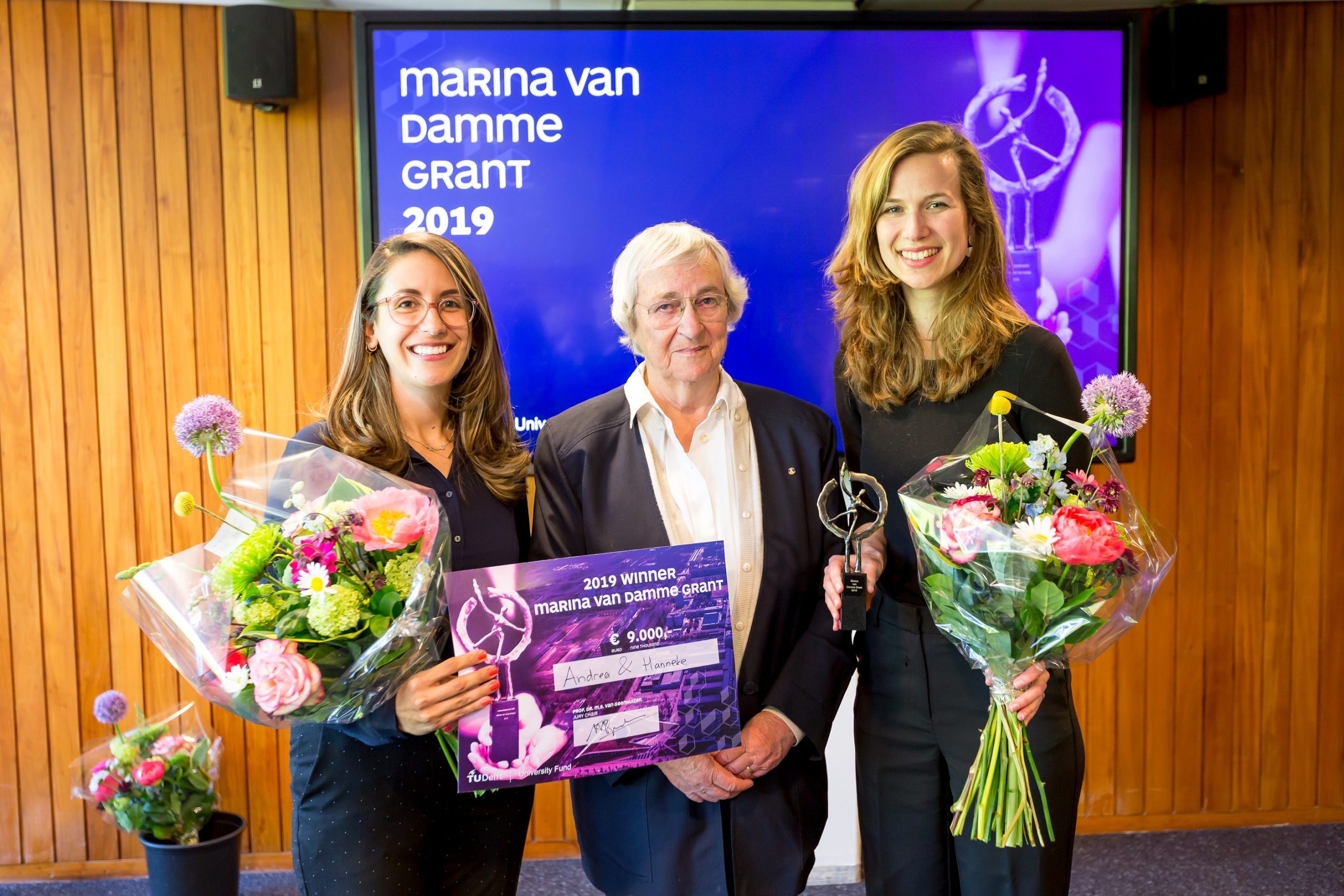Not one, but two female TU Delft alumni won this year’s Marina van Damme Grant. Andrea Mangel Raventos and Hanneke Stenfert were both awarded EUR 9,000 each.
Marina van Damme with the two winners of the grant: Andrea Mangel Raventos (left) and Hanneke Stenfert (right). (Photo: TU Delft University Fund)
A unique situation presented itself last Tuesday when the jury of the Marina van Damme Grant, an event organised by the TU Delft University Fund, was unable to select a winner. Or as Marina van Damme herself put it, “Andrea Mangel Raventos and Hanneke Stenfert are so different, but at the same time equally good considering their future plans.” Delta spoke with Mangel Raventos and Stenfert on how winning this amount contributes to developing their careers.
First of all, congratulations to the both of you. Did you expect the day to turn out like this?
Mangel Raventos: “I came in with low expectations and tried not to get too excited about it.”
Stenfert: “For me, it actually felt really good. Andrea is a very good candidate, so I had no expectations. I was merely grateful because preparing for this final presentation helped me to organize my thoughts.”
Hanneke, one of the key points in your plan is to conduct three international case studies on co-creation. Can you elaborate on that?
Stenfert: “I work as an architect for my own company, Open Kaart, with a focus on and fascination for co-creation. I have gained a lot of experience working on projects since 2014. But in order to develop as a co-creative expert, I always try to find ways to reflect on that practice as well.”
“That’s why I also work as a researcher for the TU Delft Science Communication department. Co-creation is not widespread in urban development and architecture. I would like to contribute to the co-creative discipline. That’s why I applied for this grant; it gives me the opportunity to take time to research some international case studies.”
“I do research because I find it’s very important to make time to reflect and grow and contribute to academia. Co-creation as a discipline is not widespread; in urban development and architecture, for instance, hardly any firms are focussing on this. I would like to contribute to that, and that’s why I applied for this grant. It gives me the opportunity to take time off and research some international case studies.”
What places are you hoping to visit?
Stenfert: “I still have to define that, but Chile is on top of my list. There’s a really inspiring company there which has been experimenting for years. I know a lot of other interesting projects as well, but I first need to design the case study.”
Andrea, you’re currently a PhD student at the faculty of Mechanical, Maritime and Materials Engineering, what are you going to spend the grant on?
Mangel Raventos: “Besides my research on bridging the gap between how we are going to produce energy in the future and how we are going to consume it, I’m also very interested in developing certain soft skills such as leadership and communication. Universities don’t really teach these skills, but they are becoming increasingly important. Subsequently, I found the Homeward Bound Project. It’s a programme that teaches these soft skills, but is also committed to getting more women into leadership positions. This Australian-based initiative is aiming to build a network of a thousand women in ten consecutive years. The yearlong programme will teach me multiple soft skills and concludes with a three-week expedition to Antarctica.”
What are your short- and long-term goals?
Mangel Raventos: “Well, first of all, I want to finish my PhD. And with the skills I’ve learned, I hope to find the direction I want my career to take. Right now, I’m leaning towards science communication with a focus on the urgency to take climate action. My long-term goal is to work at breaking down the barriers women face to get into leadership positions.”
And for you, Hanneke?
Stenfert: “My short-term goals are to visit three co-creative projects and to analyse and write about them. In the long term, I want to keep working on co-creation at the intersection of theory and practice. I hope to develop expertise with impact and try to contribute to the discipline.”
- The Marina van Damme Grant is awarded each year to talented female alumni from Delft University of Technology, Eindhoven University of Technology, the University of Twente or Wageningen University. It consists of a grant of €9000 and an award. This grant is made possible thanks to Dr. Marina van Damme. She obtained her Master’s degree at TU Delft in 1953 and was the first female student to obtain her PhD at the former Technical University College Twente in 1965.
Heb je een vraag of opmerking over dit artikel?
m.vanderveldt@tudelft.nl


Comments are closed.